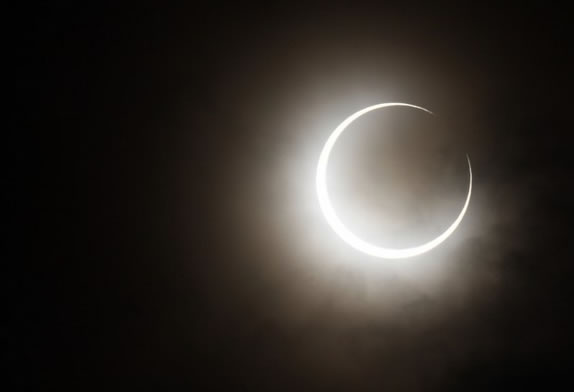Jun 11 2013
Don’t Stare Directly Into the Sun
 This is the sort of thing that most people learn when they are very young. In fact, you don’t necessarily have to learn this – light that is bright enough to damage the retina is also painful and will cause you to close your eyes or look away. So telling people not to stare into the sun is the equivalent of telling them not to put their hand into a raging fire.
This is the sort of thing that most people learn when they are very young. In fact, you don’t necessarily have to learn this – light that is bright enough to damage the retina is also painful and will cause you to close your eyes or look away. So telling people not to stare into the sun is the equivalent of telling them not to put their hand into a raging fire.
The exception here is an annular or partial solar eclipse – when most of the sun is blocked out by the Moon but a tiny sliver remains, that sliver is still bright enough to carve out pieces of your retina but too small to cause pain. Telling people not to stare directly at a solar eclipse is therefore useful advice.
Given the human penchant for believing feel-good nonsense it should not come as a surprise that there are those who advocate sungazing – staring into the sun. They believe this will give them magical powers.
During your first 3 months of practice, the suns energy is moving through the eyes and charging the hypothalamus tract, says those who have studied this technique and used it. The hypothalamus tract is the pathway to the rear of the retina which leads to the brain. The brain then, over time, becomes activated by the energy supply being received by the sun. You will first experience a relief of mental tension and worry, since most worry is fueled by the energy received by the foods we eat. Since food gets it’s energy from the sun, it is said to be readily available to sun-eaters without the trouble of digestion. Though hunger is said to eventually cease, it is fine to continue eating regularly during initial stages, until appetite disappears naturally.
Here’s some basic neuroscience – the hypothalamus is not a tract, it’s a gland in the brain, below the thalamus (hence the name). It is the primary connection between the nervous system and the endocrine system. It does receive input from the visual system, as light levels are used in the daily circadian rhythm, but it is not a tract nor does it convey light signal to the rest of the brain.
After that bit of neuro-pseudoscience, we have this:
By seven and a half months of gazing, now at 35 minutes, need and desire for food is dwindling. According to sun gazing experts, food is not actually needed to maintain the body, only energy – and ‘sun-eating’ provides that energy. By 9 months, all taste for food, including aroma, all hunger pains and cravings disappear. Those who make it this far say that they report a noticeable ’change’ in the way their brain feels – like it’s “charged up.”
I suspect that all desire for food dwindles because you are dead. According to “sungazing experts” food is only needed for energy. This is patently wrong. We get more than energy from food. If all we needed was energy you could live on pure sugar.
We also get vitamins, minerals, micronutrients, and essential amino acids and lipids from food. Vitamins and minerals provide no calories – no energy – but they are needed in order for the body’s biochemistry to work. Essential amino acids and lipids can provide energy, but they are essential because they are also structural elements and our bodies cannot make them for themselves, and therefore have to get them in food (hence “essential”).
I know this is an easy one today – but this is dangerous pseudoscientific advice that gets basic scientific facts completely wrong. A woman in Seattle apparently wants to follow the advice of sungazers. She plans on recording her attempt to live entirely on sunshine, to eliminate the possibility of cheating. Apparently, others who have claimed to live entirely on sunshine were not believed by many skeptics, who accused them of cheating (getting the occasional Big Mac on the side).
She is therefore going to record her every living moment. She had hoped to live stream it, but apparently there are some technical hurdles there. In any case, let’s hope this does not turn into a snuff film, and that she eventually breaks down and has some food. She has already lost 20 pounds. She believes that when her body is sufficiently starved, then it will switch over to sunlight as a source of energy.
Some people are just destined to be the poster child for scientific illiteracy.






